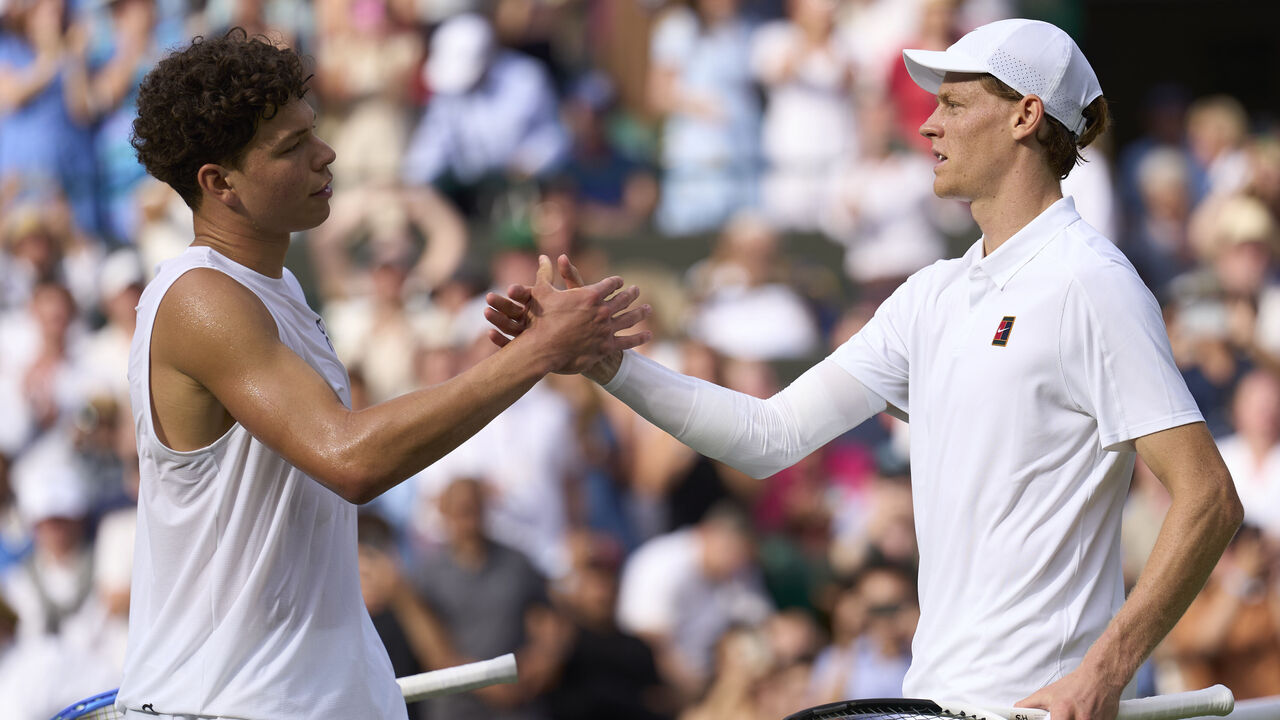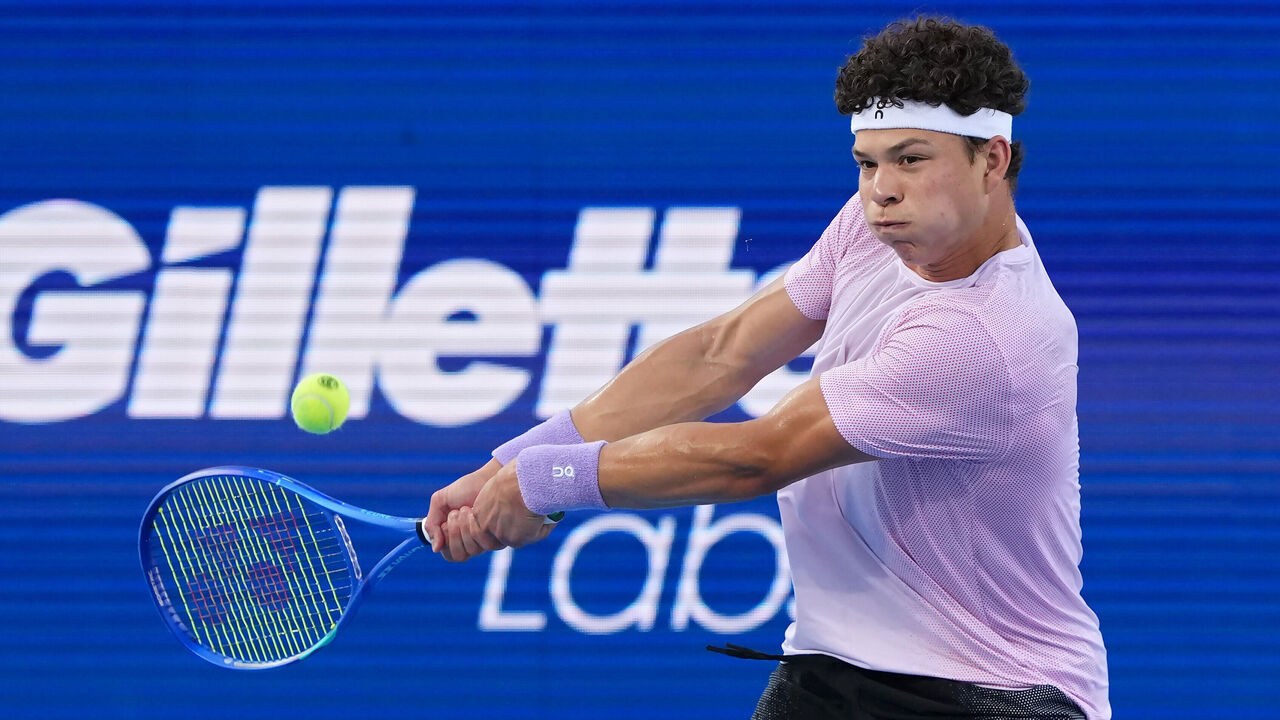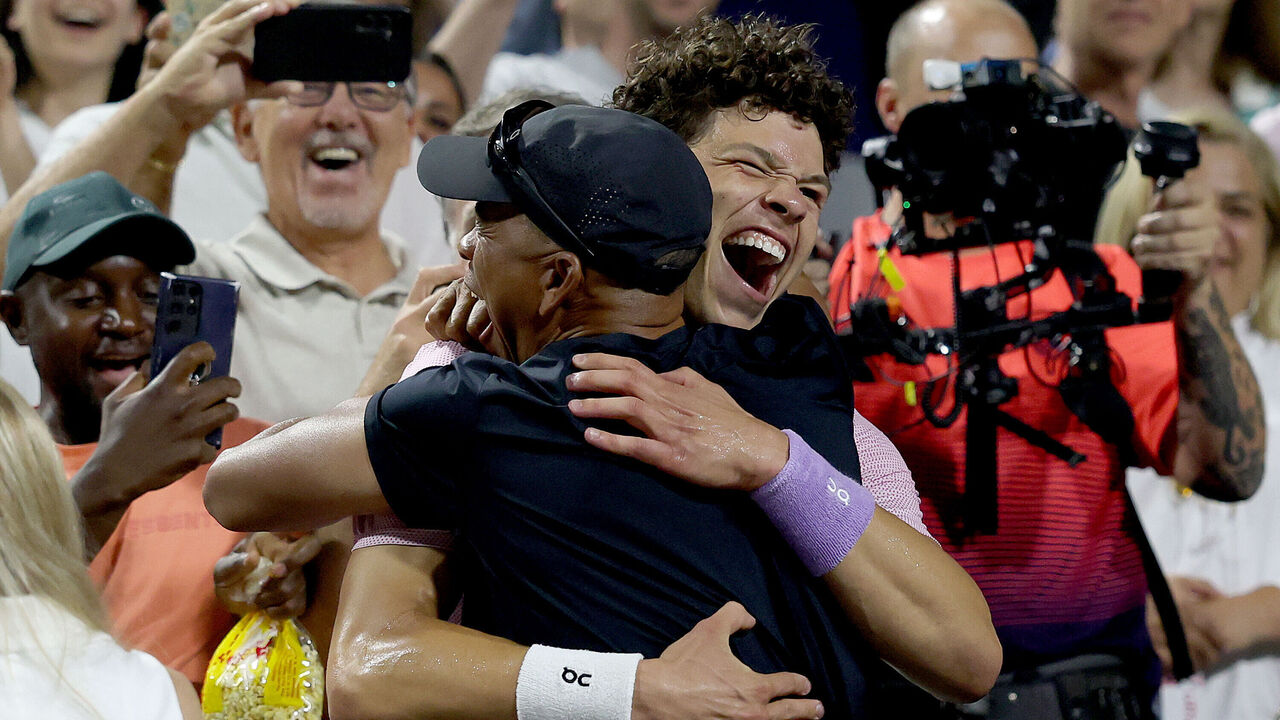Shelton looks to keep evolving at US Open after 1st Masters 1000 crown
Ben Shelton always seems to save his best tennis for the sport's biggest stages.
The 22-year-old has already made two major semifinals in just three full pro seasons, and he's the fourth-youngest American man to reach the fourth round or better at all four Grand Slams.
Shelton has won over 70% of his matches at the major level, including an 11-3 mark this season. But his two defeats to Jannik Sinner and French Open loss to Carlos Alcaraz have served as his biggest teaching moments.
"It's always good to be able to get to the point (of the tournament) where you're playing against the best," Shelton told theScore last July at the National Bank Open in Toronto. "Every match that I play ... against one of the best players in the world is huge for me, and I think continues to help develop and move me forward.
"For me, it's just learning what I'm good at. What I'm not good at. What I need to be better at. I'm a player who is developing. I don't think I'm where I want to be yet, and that's kind of what I put all my focus into after playing matches against some of the best players in the world. What I need to do better to be at that level."

Tiebreakers have been Shelton's kryptonite: He's won just over 50% of them during his brief career, even though he's armed with one of the fastest serves on the ATP Tour. He lost five of six tiebreakers in his Wimbledon tuneup events, which led to a pair of early exits. He also dropped the first-set tiebreaker in each of his Grand Slam meetings this year against both Sinner and Alcaraz.
However, Shelton has shown some progress during the summer hard-court swing, specifically in Toronto, where he captured his maiden Masters 1000 crown. The Florida product won three third-set tiebreakers, including the championship-clincher against Karen Khachanov.
Shelton kept most of the rallies short, applying pressure on Khachanov early in the point to force multiple errors. With Khachanov trailing 5-2 in the tiebreaker and on his serve, the American ripped a huge forehand return winner and subsequently closed out the match two points later.
"Just really proud that Ben was brave in the breaker, especially the early part of the breaker to get that lead," said Ben's father and coach, Bryan Shelton, about his son's approach in the decisive tiebreaker versus Khachanov.
"He went for his shots. Trusted the work that he's put in, and he executed," the elder Shelton added. "He's doing the right things. I think for him, it's just being willing to continue to be brave in the moments."
Shelton's playing his best tennis entering his first-round US Open match Sunday against qualifier Ignacio Buse. He's ranked a career-high sixth in the world and has reached the quarterfinals or better at four consecutive ATP tour-level events for the first time.
Shelton's improved backhand has been a major part of his evolution this year and adds another reliable weapon to his arsenal. The former NCAA champ made some technical changes to it after spending the offseason watching video of Novak Djokovic, Sinner, and Alcaraz's groundstroke. It's allowed Shelton to be more competitive in longer rallies and not so overdependent on his serve to win matches.
"The biggest piece was being able to hit it on the move," Shelton said of his backhand. "I think any shot that you can hit on the move and in uncomfortable positions, it just makes the shot better in general. Hitting my backhand open-stance, under pressure, (and) on the move was really big for me for passing shots because that's a side that people try to exploit.
Shelton added, "The better that I hit my backhand, the more versatile I become with it. I've been hitting it pretty well with topspin. Changing heights (and) going high sometimes over the net. Flattening some out and hitting them low. I think it makes it a lot easier to hit a shot like that when you have been varying the shot height."

Shelton's also adding more variety to his booming serve. The 22-year-old's ability to change speed with a kick serve, slice the ball out wide, and hit serves into the body as a lefty makes it difficult for opponents to get into a rhythm when returning.
Khachanov struggled to pick up on the different placements of Shelton's serve, converting just one break point and winning only 20% of first-serve return points at the National Bank Open final in early August.
"You really don't know what to expect," Khachanov told theScore following his loss to Shelton. "You not only have to make the return in play, but then he comes (back) with a big (shot) after that. So it's not (enough) just to push the ball back. You need to really return properly."
While Shelton's pleased with his progress across the board, he says the "biggest strides" this season were made on his return of serve.
Shelton took great pride in having different return styles for each opponent during the 12-day tournament in Toronto, where he faced top servers Taylor Fritz and Brandon Nakashima. The three-time ATP titlist broke each player's serve three times en route to victory.
Shelton ranks 13th in break points converted (41.88%), capitalizing on nearly 7% more of his chances from a year ago. He's also 12th on the men's circuit in second-serve return points won (709) and 13th in first-serve return points won (711).
"You just look at the stats. I'm more consistent on the return," Shelton told theScore. "I'm winning more (points) off second-serve returns by being aggressive. I'm putting more returns in play.
"I've been more versatile throughout the match to find positions that work for me on the return of serve," he added. "I'm not happy where I'm at yet, but I'm going in the right direction."

Shelton's run in Toronto showcased how quickly his game has grown since he starred for the Gators at the collegiate level just a few years ago. The former SEC Player of the Year displayed patience and shot variety in extended rallies to outlast Alex de Minaur in the quarterfinal and then overpowered Fritz in the semifinal with his signature attacking tennis.
Shelton's constantly looking to see where he can gain an edge. The No. 6 seed watches at least one set of film on his next opponent before their matchup. He says film study has been a "huge piece" for him, and admits he may have previously overlooked its importance since he felt he could impose his game on anybody.
The young American is also taking in all the input from his father, who had a decorated NCAA coaching career with Georgia Tech and Florida following his playing days.
Shelton appreciates Bryan's honesty and the bits of information he provides him during a match. But he also gives his son space in the big moments to play his game.
"(Shelton) kids around all the time, 'My dad still wants me to come to the net more. My dad still wants me to do certain things.' Some of those things he's still leaving on the table," Bryan said. "I'm gonna continue to push him to make the right decisions that are not necessarily gonna win today, but are gonna help him in the future.
"It's just having that long-term vision of the player that he really wants to be. I think as (long) he's willing to do the things that are necessary for him to move in that right direction, then I think he'll be more consistent. ... I don't think he's really scratched the surface to (become) the player that he can be."
HEADLINES
- Mboko, Tjen among the ITF's breakthrough players
- Retired great Nadal undergoes hand surgery to relieve pain
- French player banned 20 years, fined $70K for fixing tennis matches
- Alcaraz, other stars appear at inaugural tennis event at Marlins' ballpark
- Murray doesn't regret 'disappointing' coaching stint with Djokovic